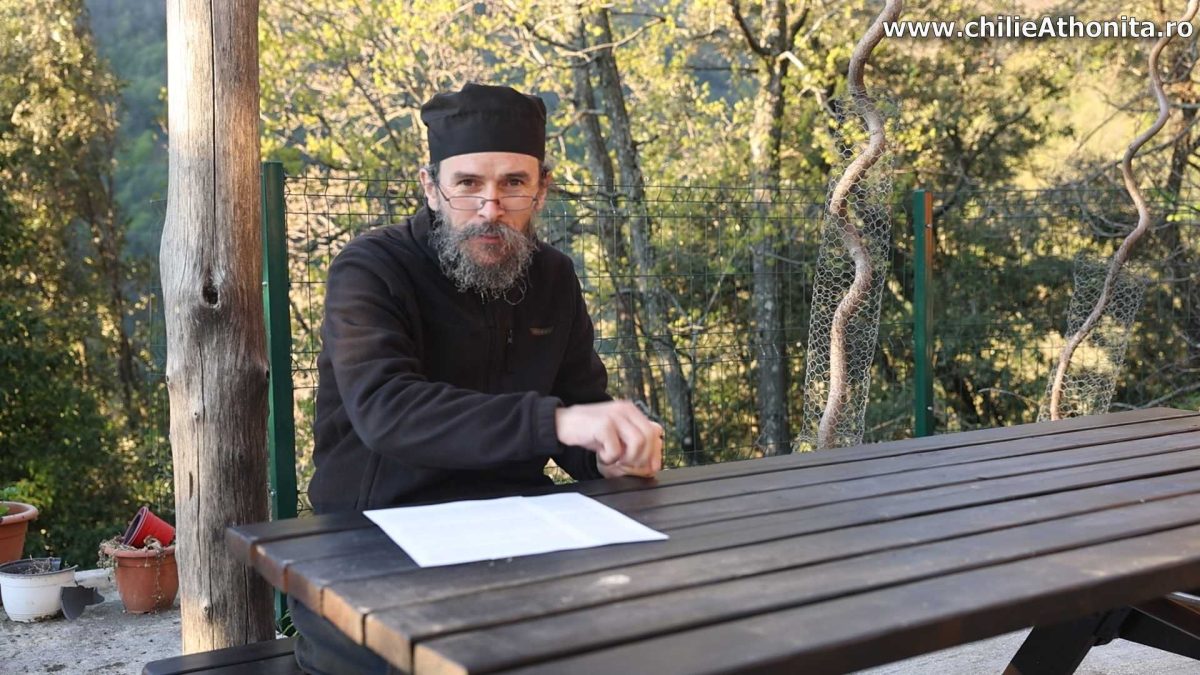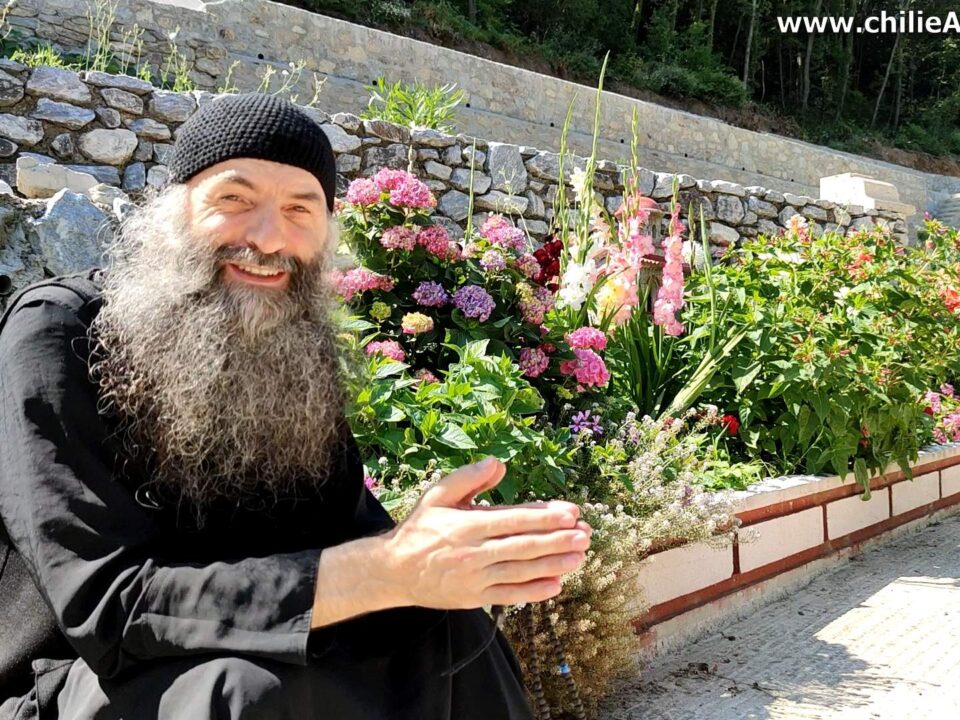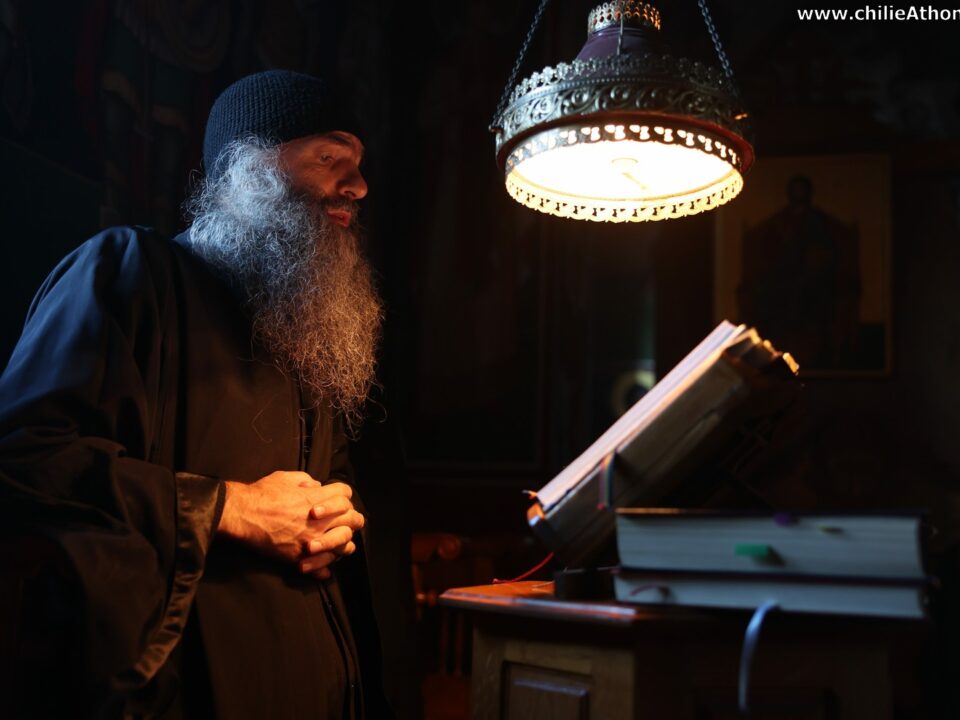
The Resurrection of the Dead: A Demonstration – Father Theologos
12 April 2022
Thoughts for Pascha – Father Pimen Vlad
22 April 2022Most of us detest Judas and appreciate Mary, the sister of Lazarus who anointed the Lord with myrrh and washed His feet with the hair of her head. However, don’t our actions show us to be in reality the exact opposite of what we think?
Watch this video to find out about this together with other mysteries hidden in the events that happened in Holy Week.
Enjoy!
He cannot wait… I have seen this brethren and you should know that it is gross. I mean, he is so much a slave to the stomach that he can’t. An Athonite Cell Joys from the Holy Mountain Glory to the Father, and to the Son, and to the Holy Spirit, now and forever and unto the ages of ages. Amen. Through the prayers of our Holy Fathers, Lord Jesus Christ, Son of God, have mercy on us! Amen We’re going to talk a little bit about Bright Week. First of all, you should know that it is called Bright Week, not because the days are brighter during that week, but because the importance of these days is very high. It’s much higher than the other weeks over the year and in fact, you should know that they were the most important days in human history.
The Holy Evangelists paid special attention to Bright Week. The three Evangelists – Mark, Matthew and Luke dedicated a third of their Gospels to Bright Week, while St. John the Theologian dedicated half of his Gospel to Bright Week. Of course it is a very broad theme and because of this I will not talk about the whole Bright Week, rather I will speak for as long as the time allows, very likely I will only talk about Holy Wednesday and Holy Thursday. Better said, I will talk about the anointing of the Lord by a woman and about Judas, about the personality of Judas. And of course, all of these will be in correlation with what we should be understanding from all these things and how we must behave in relation to these deeds from the life of our Lord Jesus Christ. I have the Scripture in front of me. I always prefer to have the Scripture printed. I don’t have the book because I have pieces from several Evangelists that I’ve put together so I can comment on the text. Let’s read a little: When Jesus had finished saying all these things, He said to His disciples, “You know that after two days is the Passover, and the Son of Man will be delivered up to be crucified.” Then the chief priests, the scribes, and the elders of the people assembled at the palace of the high priest, who was called Caiaphas, and plotted to take Jesus by trickery and kill Him. But they said, “Not during the feast, lest there be an uproar among the people.” As you can see, the chief priests made a plan but, God being almighty, being all-wise thwarted their plan and the Savior died when He wanted. Do you understand? It says that He crucified Himself. That is, He crucified Himself and people did not do this with their power. The Savior allowed Himself to be crucified.
Now, what else does it say here? And when Jesus was in Bethany at the house of Simon the leper, Simon the leper… Well, if he was a leper, he couldn’t have had a house. Simon the Leper was one of the leading Pharisees in Jerusalem whom the Savior had healed of his leprosy and in whose house the anointing of our Lord Jesus Christ by a sinful woman happens. You should know that there were several women who anointed the Lord. This is a very great mystery, hidden in the gospel. Some speak of one woman who anointed the Lord, that is, the sinful woman and Mary, the sister of Lazarus being one and the same. Others – most – speak of two women. That is, of another sinful woman to whom the Apostle Luke refers to, and others speak of three women. Most of them, as I said, including Saint John Chrysostom, speak of two women. So the sinful woman from St. Luke and Mary, the sister of Lazarus. The sinful woman from Luke anointed the Savior somewhere in the midst of His missionary activity here on earth, while Mary, the sister of Lazarus, anointed the Lord a few days before His death. Because both episodes take place in the house of Simon the Leper, it is very likely that at the first anointment, Mary was present and impressed by the gesture of the sinful woman, now, at the end of His missionary activity, Mary repeats this gesture to the Savior, wiping His feet with the hair of her head, as a sign of gratitude for the fact that He raised her brother, Lazarus.
Now, you should know, again a very important detail is the fact that for women to unbraid their hair, to be with unbraided hair was a very bad sign, a sign of shame, something to be blamed for at that time. Why? Because only the dissolute women had their hair unbraided. And because of this, the Apostle Paul speaks to the Corinthians instructing women to have their hair under a headscarf because when a woman leaves her hair free, this shows that the woman in question is of loose morals and goes after men. And why does he say this to the Corinthians? Because in Corinth there was the great temple of the goddess Aphrodite, of the goddess of fornication, and the priestesses of this goddess walked with their heads uncovered. Priestesses who, of course, were dissolute women. And that is why, until today, women should wear headscarves in the church. I don’t know if you knew that. Because the sign of a woman with loose morals is unbraided hair, is an uncovered head. Of course, the most important point in this episode is the anointing of our Lord Jesus Christ which is said here: And when Jesus was in Bethany at the house of Simon the leper, a woman came to Him having an alabaster flask of very costly fragrant oil…
You should know that it was about 300 denarii 300 denarii was a very large amount at that time, it was a man’s salary for a year. What can I say? Today it would be about 10 thousand euros. At least. So think about it, she had a cassette, an alabaster in the terms of the old language alavastro, in Greek – which was a clay pot that breaks, actually a clay pot that is sealed, it breaks, and the whole thing, imagine, cost about 10 thousand euros or 12 thousand euros, depending on how much someone’s salary is these days. And she poured it on His head as He sat at the table. You should know that at the time, people were sitting at the table not the way I am sitting now. This way didn’t exist, but the people were lounging, so they were lying on the ground. The Savior was leaning on his elbow, so those at the table stood leaning on their elbow, bent over, and this also explains how she approached Him at the back and because the Savior was laying down, she was able to pour the myrrh on His head in fact, all over His body and after that, she leaned towards His feet and wiped His feet with the hair of her head. Do you understand? Feet which, of course, at the time, people did not wash their feet, they walked barefoot. So the feet of our Lord Jesus Christ were full of mud and dust. Probably they may have smelled.
God knows, but what I want to say is, don’t imagine it like in a Hollywood movie where the actor’s feet are washed and… I speak of a gesture of extreme humility on Mary’s part and especially since everyone else saw Mary, the sister of a public figure… Because Simon the leper was one of the top Pharisees in Jerusalem, and all the Pharisees were there, they saw Mary, the daughter of this public figure, the daughter of this star, actually behaving like a harlot relative to the Savior. So we are talking about an extraordinary humility, talking about a very sensitive gesture on Mary’s part, beyond the fact that she spent 10 thousand euros in an instant. It’s true though that today others spend a lot more on much less pious things. Because of that, so that I don’t go any further….Brethren, you should know that the moment someone judges the Church or judges the people who give all kinds of gifts to the Church, you should know that they are like Judas.
Because in that moment Judas was totally insensitive to this woman who, in fact, deserted herself in front of the Savior like the myrrh, and Judas said, with the airs of a vigilante, with the airs of a lawyer of human rights, said, which is especially noted by St. John the Theologian with sadness, if you wish: But one of his disciples, Judas Iscariot, who was later to betray him, objected, “Why was not this ointment sold for three hundred pence, and given to the poor?” I mean, Judas was so fine, so smart, so… social, if you will, that he was putting logic first and no one had figured out why he had said that, and it seemed like a very democratic, very social thing until St. John notes: This he said, not that he cared for the poor, but because he was a thief, and had the money box; and he used to take what was put in it. Do you understand? It is very, very important that we are not like Judas.
That is, in no way to somehow judge others when they offer something to the Church or give alms, we should not act as vigilantes, acting like political people if you wish, acting quote on quote, merciful. Let’s in no way judge those who are merciful, those who repent, those who desert themselves like myrrh before our Lord Jesus Christ. And in fact, we do this not because we care about the poor, but because we also want to take something from the money that is offered to the Church. Understand? And Judas especially, you see, had a very important position in the community of apostles, he was the treasurer of that community. Because Judas was very well-read. I don’t know if you know, he had previously been Herod’s treasurer. In Zeffirelli’s film, he appears as a man of the Jewish resistance, but he was actually a very well-read man and was Herod’s right-hand man, and because of that, the moment he came to the small community of the Savior he received a very high position of responsibility and was the steward. And to this day, the steward in a monastery has a central position. And the Savior did this not out of ignorance, because the Savior says at one point: Have I not chosen all of you? And one of you is a devil. That is, diavalo means to resist. So one of you is an opposer. He is always in opposition to Me. St. John the Theologian notes that He said this about Judas Iscariot, about the one who was going to sell Him. Of course, Judas sold the Savior not for 300 denarii, but for a much smaller sum, for 30 denarii. That is, a monthly salary, a monthly remuneration. In the same way today, folks, you should know that so many of us sell Christ for a monthly salary, for a monthly remuneration. That is, we forget about God, we forget about holy things so that we can make money, so that we have time to make money, to fulfill our careers, to advance in our careers. Folks, it’s not good! Rather, we must be like Mary, the sister of Lazarus, who repents, who goes beyond the boundaries of logic, who tramples underfoot all her public prestige, all the prestige of a star’s daughter, of someone famous in Jerusalem – Simon the leper, – and makes this extraordinary gesture out of love for our Lord Jesus Christ. She had given all her love in that moment. Yes. To continue: But when Jesus was aware of it, He said to them, “Why do you trouble the woman? For she has done a good work for Me. For you have the poor with you always, but Me you do not have always. For in pouring this fragrant oil on My body, she did it for My burial. Assuredly, I say to you, wherever this gospel is preached in the whole world, what this woman has done will also be told as a memorial to her.” So do you see how humble the Savior is? How humble He is!
The Savior could tell him, “But aren’t you ashamed, pig?” Do you understand? Or said something much harsher. Because the Savior was 33 years old while Judas was about 18 years old, 20 years old, something like that. He could have set him straight. But the Savior humbles Himself. He who is the teacher, the omniscient and all-wise God, Rabbi, humbles Himself in front of His disciple who was of an unimaginable insolence. Because Judas responds so phlegmatically, but also cunningly that is, politically. The Savior humbles Himself and explains and above all, does not point the finger at him. He speaks in the plural. He says, “Why do you trouble the woman? In order to not sever the connection with Judas because he knew Judas was dying, dying spiritually. Judas was already beginning to rot spiritually, he was beginning to turn away from the Savior, from God. Of course, although God is humble, you see that He sets him right. He says, “…wherever this gospel is preached in the whole world, what this woman has done will also be told as a memorial to her.” That is, the deed of this woman remained and will remain forever, a woman which, out of delicacy, the Holy Apostle and Evangelist Mark does not name, but St. John the Theologian names her – it is Mary, the sister of Lazarus and the sister of Martha. So as you can see, on the one hand the Savior is humble but on the other hand He does not validate sin. We cannot validate sin. Do you understand?
And then, Judas who understood the message, and who was already under demonic influence, breaks, “That’s it. I am done. No.” The Savior speaks very humbly. What does it say? Then one of the twelve, called Judas Iscariot, went to the chief priests and said, “What are you willing to give me if I deliver Him to you?” And they counted out to him thirty pieces of silver. (So a salary… They paid him) So from that time he sought opportunity to betray Him. So Judas, you should know, didn’t so much want the Savior to be caught, but he wanted money. And because of this Judas is condemned in the Church services – listen and you will see – as a lover of silver, as a wage earner, like all of us. Do you understand, brethren? All of us today are striving to make money. And of course, we package it nicely, “We make money for the family.” We are not making money for the family, brethren, the family has… Of course we need to have food to eat, but we make money because we want to make money, that’s our goal. Like Judas. We are all like that, brethren! Apart from the 1% to which I bow. Yes?
Now on the first day of the Feast of the Unleavened Bread the disciples came to Jesus, saying to Him, “Where do You want us to prepare for You to eat the Passover?” It is an old custom of the Jews which means the passage to the Promised Land and in this case the Savior moves it to a spiritual plane, – the passage to heaven. This is Passover. We won’t go into too many details, as we should do a whole doctorate on what Passover means in the Old Testament. And He said, “Go into the city to a certain man, and say to him, ‘The Teacher says, “My time is at hand; I will keep the Passover at your house with My disciples.”” So the disciples did as Jesus had directed them; and they prepared the Passover. Now, “Go into the city to a certain man…” Why is it not noted who “a certain man” is? Because “a certain man” was actually the father of Holy Apostles John and James. It was Zebedee. Until today it is known in Jerusalem – I don’t know if you were there in Yperoo in the gazebo upstairs, that is where the Last Supper was, the Mystical Supper. It is called the Mystical Supper because it was hidden, so as not to be caught by the Jews, but especially because that was when the central mystery of the church was instituted, which is Holy Communion, Thia Metalipsi. Metalipsi in Greek, that is, I communicate myself with our Lord Jesus Christ, I commune with our Lord Jesus Christ or I commune of our Lord Jesus Christ. So the union with God as a Mystery was instituted there and because of this it is called the Mystical Supper.
Peter and John the disciples came to Jesus and asked Him, “Where do You want us to prepare for You to eat the Passover?” Who were the two disciples? You should know that they were the Holy Apostle Peter and the Holy Apostle John. Peter as the icon, as the representation of practical life, and St. John the Apostle who was very young, was about 18 years old – something like that – and loved Him enormously, he loved our Lord Jesus Christ, who was also a relative of his, completely. St. John was the icon of the contemplative life, of the spiritual life par excellence. When evening had come, He sat down with the twelve. Now as they were eating, Jesus said, “Assuredly, I say to you, one of you will betray Me.” So the Savior is not an attacker, He is not aggressive, saying – “Guys, watch yourselves…” No! He said, “Assuredly, I say to you, one of you will betray Me.” So the Savior was gentle and humble at heart and all marveled at the phenomenal presence of our Lord Jesus Christ who manifested His power through His total lack of power, through His total delicacy. And He tries, as you can see, to slowly, slowly, make Judas repent, to not trample on the relationship between Him and Judas but without, once again, validating sin. So He shows Judas that He knows what’s going on, that He’s not a fool, He’s not infantile, but despite all this, He does not walk all over Judas.
And they were exceedingly sorrowful, (meaning all the disciples) and each of them began to say to Him, “Lord, is it I?” He answered and said, “He who dipped his hand with Me in the dish will betray Me. Which is phenomenal – so think about it – we are talking about a plate and I put my hand in there to soak my bread in oil or water and the other one is such a hog, so greedy that he can’t wait a minute! A minute until I dip my bread in the water to eat or take something from there. So he can’t wait… I’ve seen this, brethren, you should know that it is gross. Meaning he is such a slave to his stomach that he can’t wait. And things do not stop here because St. John the Theologian notes, not, “He who dipped his hand with Me in the dish will betray Me” but rather, he says it differently, he says, “It is he to whom I shall give a piece of bread when I have dipped it.” That’s who will betray Me. I mean how? So one says: that the one who stretches out his hand in the plate with Me will sell Me, that is, he puts his hand in there… it’s about his Teacher, it’s about Rabbi, it’s about God and yet… And the other says: The one to whom I give the piece. How is this reconciled? Brethren, both happened! I mean, Judas was such a hog that not only did he put his hand in that plate, look at a plate that you have in front of you, to have somebody stick his hand with you in the plate. And not only that, but in that moment the Savior says: Here, take it. And Judas takes that one too and eats it. Do you understand?
This is the man who is totally and utterly flesh, who continually wants to eat, he continually wants to have riches, he continually can’t get enough. As it is said among the people: “God no longer satiates him.” This was Judas. And the Savior was humble. Do you understand? And the Savior goes on and says: “The Son of Man indeed goes just as it is written of Him” Meaning all these things, all this decadence of human nature was prophesied from the ages because it was the necessary result of the separation from God. Judas, brethren, you should know, was not, as some say, a tool, a divine instrument, and therefore Judas could not do otherwise. No! Judas had potentiated his hatred to the fullest, he had potentiated to the fullest his closure from the delicacy of Christ. Judas potentiated to the maximum his love for the material, for food, for money, for glory. Do you understand? Because Judas wanted to be number one, and that’s why he gave this lesson to the Savior. That is why he always responded against the Savior.
And the Savior says again: The Son of Man indeed goes just as it is written of Him, but woe to that man by whom the Son of Man is betrayed! It would have been good for that man (He does not say “you”!) It would have been good for that man if he had not been born.” Then Judas, who was betraying Him, answered and said, “Rabbi, is it I?” Meaning his conscience rebuked him so much, he asks – “Rabbi, is it I?” And the Savior said to him “You have said it.” That is, your conscience rebukes you because you are like that. So look at your conscience, listen to your conscience and stop doing that, stop! And as they were eating, Jesus took bread, blessed and broke it, and gave it to the disciples and said, “Take, eat; this is My body.” Then He took the cup, and gave thanks, and gave it to them, saying, “Drink from it, all of you. For this is My blood of the new covenant, which is shed for many for the remission of sins. So as you can see, the Savior with His power, with the power of His total love, does everything possible, He gives Himself to us in the most plenary way, the most total way from the spiritual point of view, but also from the bodily point of view, that is, He is giving Himself to us to swallow Him. Effectively to have Him within us bodily in addition to spiritually. This is the great Mystery of Holy Communion. That is, God’s complete offering of Himself to us. God offers Himself to us totally and we offer Him – nothing, nothing… Well…. Of course, after that, the disciples all scattered and so on… Understand? Let’s not get into the theology of of Holy Communion because, once again, we would have to speak extraordinary long about this. And the Savior continues: But I say to you, I will not drink of this fruit of the vine from now on until that day when I drink it new with you in My Father’s kingdom. That is, He tells them very clearly, brethren, I will die! But of course they don’t…
And when they had sung a hymn, they went out to the Mount of Olives. “They had sung a hymn” – So brethren, the Divine Liturgy is not for singing hymns. The Divine Liturgy is not done to sing hymns, because as you can see they sang hymns after they took the Communion. The Divine Liturgy is done for the Communion of believers. It’s a service with a specific purpose! It isn’t a service of glorification of God. Even if during the Divine Liturgy God is glorified like nowhere else. So when we go to the Divine Liturgy, – and we have to go to the Divine Liturgy – we go there to Commune. Let’s wake up a little bit. That is why we go to the Divine Liturgy. Understand? They went out to the Mount of Olives. Then Jesus said to them, “All of you will be made to stumble because of Me this night, for it is written: ‘I will strike the Shepherd, and the sheep of the flock will be scattered.’ Meaning, you depend on Me, brethren, you are not on your own. Your existence, your grace and your energy, your existential fuel is from Me, so if I disappear, you all dissipate. Of course, they did not understood at all. And the Savior notes afterwards, lest they be discouraged, though their minds were dark: But after I have been raised, I will go before you to Galilee.
That is, after you dissipate and tear yourselves to pieces, remember that I told you that I would rise and meet you in Galilee. So the Savior, as the master of the whole situation… Think brethren, so He knew He was dying, and yet, as God, He was Lord almighty over everything. Yes? Phenomenal. Then Peter acts smart, Peter answered and said to Him, “Even if all are made to stumble because of You, I will never be made to stumble.” So he says if they all do that, he will not! He took pride in himself, Jesus said to him, “Assuredly, I say to you that this night, before the rooster crows, you will deny Me three times.” One Evangelist says: “before the rooster crows”, another Evangelist says “before the rooster crows three times.” What does it mean once and three times? Brethren, think about how the alarm of a clock sounds or the alarm on your cell phones since you have those. The alarm sounds several times, and the rooster – if you have ever heard a rooster in the morning – if the good God gives you to wake up in the morning to hear the rooster crow, the rooster crows “cook-a-doodle-do, cook-a-doodle-do, cook-a-doodle-do”. So the rooster crows several times. And Peter was so darkened at the time of his denial of Christ that even though the rooster crowed continuously, he still did not wake up.
These are the effects of pride, brethren! They are the effects of pride, the effects of forsaking God. Do you understand? Peter said to Him, “Even if I have to die with You, I will not deny You!” I mean, Peter was, shall I say, arrogant! Full of himself. He was full of pride. Do you understand? And because of this the Savior rightly said: Since you can do it alone, since you trust yourself, I leave you. And then Peter fell, of course. And all the disciples said the same. I mean, they were all darkened. Do you understand? Because we all depend on God for our enlightenment. Do not think: “I’m smart” or “I’m enlightened,” or “I know.” No one knows anything! We all depend on God, brethren! We all depend on God! Yes, that’s about it in a nutshell. We should have talked a little bit about the washing of the feet as well. Very briefly, the washing of the feet was a gesture of extreme humility, of extreme humility of Christ in front of the disciples, and you should know that it was a servant’s gesture. So only the servant washed feet and the host washed the guests’ feet. Do you understand?
In the same way that Mary washed the Savior’s feet with myrrh, likewise, the Savior washed feet — as I said, dirty feet, smelly feet, muddy feet — washed the disciples’ feet. And especially it says that He girded Himself with… So He stripped Himself of His garments and the Savior put on only a robe, an apron. So He was literally like a servant, He was naked to the bust. Do you understand? And because of this Peter said: Lord, You shall never wash my feet. When he saw this gesture of extreme humility of Rabbi. So think about the Patriarch coming or God coming to wash your feet. I saw the service. It’s very impressive when the one you love the most does this for you. And especially, consider that many in Tradition say that Judas was the first to go to the Savior with insolence to have his feet washed. Yes, it’s a democracy, so why show respect? And because of this, when Peter came second, because Peter was the doyan of the group, the oldest among them, when he saw the extraordinary humility of the Savior, and when he saw the insensibility of Judah, he said: Lord, you shall never wash my feet! And then the Savior said to him, If I do not wash your feet, you have no part in Me. That is, if I do not wash you feet, if you do not let Me humble Myself before you, you will not be able to humble yourself before others because you need the personal example. You need a personal example. And at that moment, Peter said: Lord, wash my feet and my head, from top to bottom wash me, only to be united with You. And the Savior said: It is enough for Me to wash your feet. Do you understand? That’s what happened there.
And that’s why the Savior said at one point: “He who is bathed needs only to wash his feet, but is completely clean; Why? Because a person’s purity comes from his humility. And the Savior says: “and you are clean, but not all of you.” “But not all of you.” Why? Because Judas had remained stuck in his pride. Folks, let us not love money so much, let us not be so democratic, let us not be so cunning, let us not be as insensitive as Judas! Let us not be so proud, because you see what happens, we end up crucifying the good God Himself, in our hearts and sometimes, if you wish, in the reality in which we are surrounded. So help us God! I hope to do another recording, I don’t know, I’m not sure, but if I don’t do a recording, I wish you a joyful Pascha and a joyful Holy Week. May God bless us and allow us to feel His Resurrection in our hearts! May God rise in our hearts! So help us God! Through the prayers of our Holy Fathers, Lord Jesus Christ, Son of God, have mercy on us! Amen.
Pomelnice online și donații
Doamne ajută!
Dacă aveți un card și doriți să trimiteți pomelnice online și donații folosind cardul dumneavoastră, sau/și să susțineți activitatea noastră filantropică, inclusiv acest site, vă rugăm să introduceți datele necesare mai jos pentru a face o mică donație. Forma este sigură – procesatorul de carduri este Stripe – leader mondial în acest domeniu. Nu colectăm datele dvs. personale.
Dacă nu aveți card sau nu doriți să-l folosiți, accesați Pagina de donații și Pomelnice online .
Ne rugăm pentru cei dragi ai dumneavoastră! (vă rugăm nu introduceți detalii neesențiale precum dorințe, grade de rudenie, introduceri etc. Treceți DOAR numele!)
Mai ales pentru pomelnicele recurente, vă rugăm să păstrați pomelnicele sub 20 de nume. Dacă puneți un membru al familiei, noi adăugăm „și familiile lor”.
Dumnezeu să vă răsplătească dragostea!







